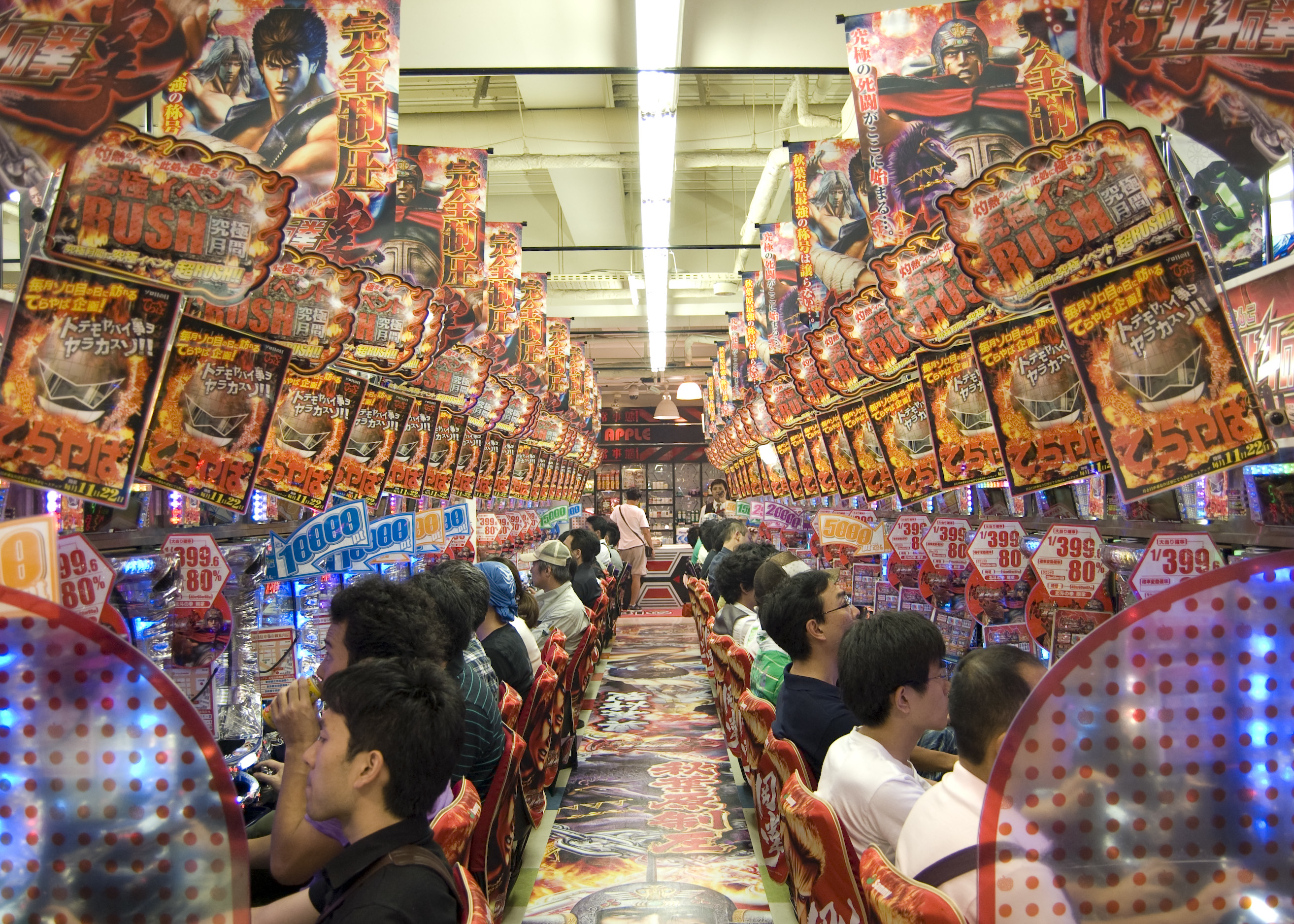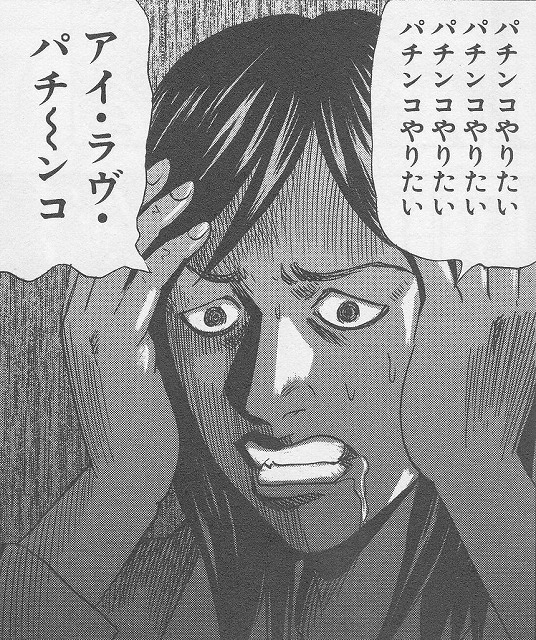
What do loud noises, small shiny balls, and bright lights have in common? Pachinko parlors. Pachinko, which can be described as a cross between pinball and slot machines, is a favorite pastime in Japan, despite gambling being illegal (because it’s not technically gambling). The players, who often spend hours sitting in front of these noisy, bright machines, win shiny steel balls, not money, so it’s not gambling, right? Right. Enter loophole: They can take their baskets of balls to a neighboring, but “separate,” establishment to exchange the balls for cash prizes. How convenient!
Pachinko parlors are often huge, gaudy buildings, common even to countryside towns. If you pass one early in the morning, there will often be a line of people rounding the corner, waiting for the doors to open. Many people, especially men, love pachinko. Some members of the government, however, are starting to believe that their citizens love it a little too much.
This past summer the Ministry of Health, Labor and Welfare conducted research on the number of citizens addicted to gambling, including boat and horse racing, pachinko, slots and even mahjong. The study found that over 5.36 million people are addicted to gambling (4.3 million men, and just under 1 million women)—that’s almost five percent of the population (and almost nine percent of all men). Further, they discovered that within this group, eighty percent of them are addicted to pachinko and slots, specifically.
▼Baskets and baskets of pachinko balls in exchange for your money.
Now, some people may find it hard to believe that you could get addicted to what is essentially pinball without the levers, but it’s a real problem. It was such a problem in Korea that the government effectively banned it, leading many addicts to travel to Japan to get their fix. In Fukushima prefecture, locals claim the nuclear disaster refugee community is found more in pachinko parlors than looking for sustainable work. People get so addicted that they throw away all of their money at the pachinko establishments, which sometimes leads to financial problems and broken families.
In the wake of the announcement of Abe’s plan to lift the gambling ban to allow the opening of casinos in Japan, the Ministry of Health, Labor and Welfare is pushing for gambling addiction counter-measures, including guidelines for pachinko parlor workers to recognize and report addicted customers, starting a hotline for addicts and their families to seek help and possibly even redesigning machines to curb addictive behavior.
▼ “I want to play pachinko… I love pachinko!”
Dr. Masayuki Oishi, owner of a gambling rehabilitation center in Yokohama, says that efforts should be focused on the most vulnerable people — the unemployed, single parents and people with financial troubles — to warn them of the “evils of gambling.”
Abe’s government is in a tricky spot. Is the call to save Japan’s gambling addicts stronger than the potential monetary boost from legalizing gambling (which could, in turn, potentially create more addicts nationwide)? With recent economic figures showing recession, resignations of cabinet members and Abe calling a snap election, who knows what the future will hold for the policies dealing with Japan’s gambling addicts.
Source: My Game News Flash, Yahoo! News
Top Image: Wikimedia Commons (Tischbeinahe)
Insert Images: Wikimedia Commons (MichaelMaggs), Agehanto Saiko



 Korea’s Ban on Pachinko Pinball Gambling Sees an Increase in Gamblers Coming to Japan
Korea’s Ban on Pachinko Pinball Gambling Sees an Increase in Gamblers Coming to Japan Here’s your heart-breaking short story of the day, written on a 1,000 yen bill
Here’s your heart-breaking short story of the day, written on a 1,000 yen bill Future Japanese casinos to use steep admission fees to curb addiction, make winning harder
Future Japanese casinos to use steep admission fees to curb addiction, make winning harder Proposed facial recognition system would send warning emails to families of pachinko addicts
Proposed facial recognition system would send warning emails to families of pachinko addicts Japanese Twitter users discuss the fine line between having fun and being an addict
Japanese Twitter users discuss the fine line between having fun and being an addict Which convenience store onigiri rice balls are the most popular? Survey reveals surprising results
Which convenience store onigiri rice balls are the most popular? Survey reveals surprising results Japanese restaurant chain serves Dragon Ball donuts and Senzu Beans this spring
Japanese restaurant chain serves Dragon Ball donuts and Senzu Beans this spring Tokyo street sweets: The must-snack treats of Nakano’s Refutei
Tokyo street sweets: The must-snack treats of Nakano’s Refutei Starbucks Japan releases first-ever Hinamatsuri Girls’ Day Frappuccino
Starbucks Japan releases first-ever Hinamatsuri Girls’ Day Frappuccino Japanese drugstore sells onigiri at pre-stupid era prices, but how do they compare to 7-Eleven?
Japanese drugstore sells onigiri at pre-stupid era prices, but how do they compare to 7-Eleven? We mixed all 31 flavors of Baskin Robbins ice cream and created a Frankenstein dessert【Video】
We mixed all 31 flavors of Baskin Robbins ice cream and created a Frankenstein dessert【Video】 The results are in! One Piece World Top 100 characters chosen in global poll
The results are in! One Piece World Top 100 characters chosen in global poll A look back on 40 years of Japanese schools banning stuff
A look back on 40 years of Japanese schools banning stuff Cherry blossom mochi lattes arrive at Japan’s Pronto cafe chain to start sakura sweets season
Cherry blossom mochi lattes arrive at Japan’s Pronto cafe chain to start sakura sweets season Japan Extreme Budget Travel! A trip from Tokyo to Izumo for just 30,000 yen [Part 2]
Japan Extreme Budget Travel! A trip from Tokyo to Izumo for just 30,000 yen [Part 2] The 10 most annoying things foreign tourists do on Japanese trains, according to locals
The 10 most annoying things foreign tourists do on Japanese trains, according to locals Highest Starbucks in Japan set to open this spring in the Tokyo sky
Highest Starbucks in Japan set to open this spring in the Tokyo sky Tokyo Skytree turns pink for the cherry blossom season
Tokyo Skytree turns pink for the cherry blossom season Starbucks Japan releases new sakura goods and drinkware for cherry blossom season 2026
Starbucks Japan releases new sakura goods and drinkware for cherry blossom season 2026 Japan’s new “Cunte” contact lenses aren’t pronounced like you’re probably thinking they are
Japan’s new “Cunte” contact lenses aren’t pronounced like you’re probably thinking they are Shibuya Station’s Hachiko Gate and Yamanote Line stairway locations change next month
Shibuya Station’s Hachiko Gate and Yamanote Line stairway locations change next month Yakuzen ramen restaurant in Tokyo is very different to a yakuza ramen restaurant
Yakuzen ramen restaurant in Tokyo is very different to a yakuza ramen restaurant Starbucks Japan adds new sakura Frappuccino and cherry blossom drinks to the menu
Starbucks Japan adds new sakura Frappuccino and cherry blossom drinks to the menu Japan just had its first same-month foreign tourist decrease in four years
Japan just had its first same-month foreign tourist decrease in four years Burning through cash just to throw things away tops list of headaches when moving house in Japan
Burning through cash just to throw things away tops list of headaches when moving house in Japan Japan’s newest Shinkansen has no seats…or passengers [Video]
Japan’s newest Shinkansen has no seats…or passengers [Video] Foreigners accounting for over 80 percent of off-course skiers needing rescue in Japan’s Hokkaido
Foreigners accounting for over 80 percent of off-course skiers needing rescue in Japan’s Hokkaido Super-salty pizza sends six kids to the hospital in Japan, linguistics blamed
Super-salty pizza sends six kids to the hospital in Japan, linguistics blamed Starbucks Japan unveils new sakura Frappuccino for cherry blossom season 2026
Starbucks Japan unveils new sakura Frappuccino for cherry blossom season 2026 Foreign tourists in Japan will get free Shinkansen tickets to promote regional tourism
Foreign tourists in Japan will get free Shinkansen tickets to promote regional tourism Take a trip to Japan’s Dododo Land, the most irritating place on Earth
Take a trip to Japan’s Dododo Land, the most irritating place on Earth Naruto and Converse team up for new line of shinobi sneakers[Photos]
Naruto and Converse team up for new line of shinobi sneakers[Photos] Is China’s don’t-go-to-Japan warning affecting the lines at a popular Tokyo gyukatsu restaurant?
Is China’s don’t-go-to-Japan warning affecting the lines at a popular Tokyo gyukatsu restaurant? Survey asks foreign tourists what bothered them in Japan, more than half gave same answer
Survey asks foreign tourists what bothered them in Japan, more than half gave same answer Japan’s human washing machines will go on sale to general public, demos to be held in Tokyo
Japan’s human washing machines will go on sale to general public, demos to be held in Tokyo Starbucks Japan releases new drinkware and goods for Valentine’s Day
Starbucks Japan releases new drinkware and goods for Valentine’s Day We deeply regret going into this tunnel on our walk in the mountains of Japan
We deeply regret going into this tunnel on our walk in the mountains of Japan Studio Ghibli releases Kodama forest spirits from Princess Mononoke to light up your home
Studio Ghibli releases Kodama forest spirits from Princess Mononoke to light up your home Major Japanese hotel chain says reservations via overseas booking sites may not be valid
Major Japanese hotel chain says reservations via overseas booking sites may not be valid Put sesame oil in your coffee? Japanese maker says it’s the best way to start your day【Taste test】
Put sesame oil in your coffee? Japanese maker says it’s the best way to start your day【Taste test】 No more using real katana for tourism activities, Japan’s National Police Agency says
No more using real katana for tourism activities, Japan’s National Police Agency says Number of pachinko parlors in Japan decreasing rapidly, down 12 percent in two years
Number of pachinko parlors in Japan decreasing rapidly, down 12 percent in two years Pachinko parlor worker lists the three worst types of customers in Japan’s gambling dens
Pachinko parlor worker lists the three worst types of customers in Japan’s gambling dens Is nothing sacred? Line crossed as beloved anime Captain Tsubasa endorses pseudo-gambling
Is nothing sacred? Line crossed as beloved anime Captain Tsubasa endorses pseudo-gambling Fukushima Refugees Rather Gamble than Work, Claims Iwaki City Mayor
Fukushima Refugees Rather Gamble than Work, Claims Iwaki City Mayor Chiba man destroys Evangelion Unit 01… pachinko machine
Chiba man destroys Evangelion Unit 01… pachinko machine Video game spending is less attractive for a lover than gambling, Japanese survey says, but why?
Video game spending is less attractive for a lover than gambling, Japanese survey says, but why? What are the most and least attractive hobbies for Japanese men and women? Survey investigates
What are the most and least attractive hobbies for Japanese men and women? Survey investigates